- Home
- Jane Peart
Mirror Bride Page 3
Mirror Bride Read online
Page 3
Kip's eyes raced along the faded print, the paper so old it crackled in his hands. "MARRIAGE CERTIFICATE. Lucas Valley, California," he read aloud, then looked at Cara. "California!"
"In 1870 too!" she said in a hushed voice.
"Malcolm Montrose and Blythe Dorman." Kip looked at Cara again. "Your mother."
"Yes! And your grandfather!"
"Yes, and there's more." Cara put her hand in the drawer and drew out a plain gold band and stretched out her palm to show Kip.
"Cara, I don't think we should take this," Kip said solemnly.
"Is history, Kip. It belongs in a time capsule. Is important to both families . . . even if Mama's married to Papa now."
Just then Kitty's voice called down the hall. "Cara! Kip! Where are you? Lily says we can go down to the kitchen for refreshments now. Come on, you two!"
"You better put this back, Cara." Kip thrust the certificate at her.
"Whas the matter? Afraid?"
"No, I'm not afraid, but—"
"Don't you think a time capsule's a good idea?"
"Yes, but I think we should put our own stuff in it, not these old things that don't belong to us. We could get in plenty of trouble, Cara."
"Kip, Cara!" Kitty's voice came again, this time closer.
"Oh, all right—" Cara sounded disappointed, but she was beginning to agree with Kip. She put the ring and certificate back in the drawer and closed it. Then they slipped out of the room, pulling the door behind them.
In an alcove at the side of the dance floor, Jonathan brought two cups of eggnog over to where Dru was seated, handed her one, then sat down beside her. Glancing at the young man dancing with his mother, he sighed. "I do sometimes feel guilty about Jeff . . . I mean, about Montclair. He's a rightful heir, too. Shouldn't he have some part of it?"
Dru put a hand on his arm. "You shouldn't feel guilty, Jonathan. We didn't even know Jeff existed when Randall and I deeded the property to you. If anyone should feel guilty, is Blythe. Is her fault. Disappearing for all those years after your father's death, never letting anyone know where she was nor that she had a child, Malcolm's son—" She paused, frowning. "Besides, you are the firstborn, and the law of primogeniture declares the oldest son inherits everything, doesn't it?"
Jonathan smiled ruefully. "In England, maybe. But, after all, didn't we break away from England during the Revolution? So I'm not sure that law holds in Virginia. Anyway, I'm more than willing to share with Jeff—"
"Why, Jonathan? Jeff is perfectly content with his life at Avalon, and Faith certainly seems radiantly happy," she remarked as Faith danced by with her father-in-law.
Just then the band stopped in the middle of a popular dance tune, and the leader held up his hand, his baton poised dramatically. The dancers stood still and everything grew very quiet. Very slowly the grandfather clock in the hall began striking the hour of midnight. At the last chime there was a burst of applause and loud cheering.
"Happy New Year!" people greeted one another as strains of "Auld Lang Syne" poured over the happy crowd.
Jonathan smiled at his cousin. "It's midnight! The start of a new century. I'll have to go find Davida, but first—" He leaned over and kissed Dru's cheek. "Happy 1900, Dru."
"Happy New Year, Jonathan," she replied and hoped with all her heart that this year would mark the beginning of a new happiness for him.
Sitting on the back stairway off the kitchen, Kip and Cara enjoyed an assortment of leftovers from the grown-ups' buffet.
"I still think a time capsule in the secret room is a great idea," Cara insisted as she spooned strawberry ice cream and lemon sponge cake into her mouth, "don't you?"
Kip found balancing his plate on his knees too much, put it down on the step, and moved to the one below before replying. "Sure," he agreed, taking a bite of the cake.
"We could use a shoebox and seal it and nobody but us would know about it."
Enthusiastically they began to plan what they would put in it.
"And we wouldn't open it for . . . how long? Ten years?"
"Longer than that—" mumbled Cara, her mouth stuffed full.
"But we want to be alive when is time to open it, don't we?"
"Twenty or fifteen years, then."
"How about. . . twelve years . . . when we're both twenty-one?" suggested Kip after a little mental calculation.
Cara's spoon halted halfway to her mouth. "Right. Twelve years from now, on New Year's Eve at midnight, we'll open it." A dreamy look crossed her face. "I wonder what the world will be like in 1912—"
Part II
New England
chapter 2
Cape Cod
Summer 1909
JUNE SUNSHINE sparkled on the water as the ferry from New Bedford eased to the landing dock at Oak Bluffs where Meredith Montrose was to meet them. The Cameron twins leaned against the deck rail, searching the crowd waiting for the passengers for their friend. They had been invited to spend the summer at Meredith's Grandfather's Cape Cod "cottage." Finally spotting her, Cara exclaimed, "There she is!" and pointed to a slender girl dressed in a light blue chambray dress just below them. Waving her hand wildly she called, "Yoohoo, Merry!"
Seeing them, Meredith took off her wide-brimmed sailor hat and waved it back at them. "Hello, twins!"
Within a few minutes they were running down the gangplank toward her with shrieks of greetings. This was the first time they had all seen each other since March, when Kitty and Cara were home on spring vacation.
"It's so good to see you!" Merry said, hugging first one, then the other.
"You look wonderful!" Kitty told her.
"You're already brown as the proverbial berry!" Cara regarded her admiringly. "I can't wait to get rid of my 'prison pallor'!"
"I didn't know you considered Fern Grove prison" Merry laughed, gaily referring to the women's college near Charlottesville where the twins had just completed their first year. "We've been here two weeks. Mama and I came up at the end of May to be with Grandfather. He was a speaker at the local Veterans Memorial Day ceremonies in Milford. Then we all three came here to open the beach house for the summer."
As they collected their baggage, Merry said, "Oh, I'm so glad you've come. We're going to have such fun; is going to be a wonderful summer."
She hailed one of the dockside porters to help them load the twins' things into the "beach wagon" Merry had driven in to meet them. Then they all climbed into the "basket," as Merry called the small pony cart, and, chatting and constantly interrupting each other, they started off.
While they drove along the cobbled streets in the main part of town, Merry gave them a capsulized background of the island, since this was their first visit. Cape Cod, a crescent shaped slice of land lying just south of the coast of Massachusetts at its most southeastern point, had a long, fascinating history. The capture of the first whale in 1668 brought with it a burst of prosperity, until the whalers almost brought the whales to extinction.
But toward the end of the last century, it had become popular mostly as a summer resort for New Englanders, Merry told them. "Is also a favorite spot for summer 'revival' Camp Meetings." She gave them a mischievous glance. "That is if you're so inclined."
"Not me!" declared Cara. "I'm here to relax, enjoy myself, and have a good time."
Merry and Kitty smiled at her enthusiasm, feeling the welcome shade of the tall elm trees lining the board walkways, and noting a few old brick houses of Federal architecture set back from the streets in the residential areas a short distance from the downtown section.
At the edge of town, they turned onto an unpaved road, plodding along at the fat little pony's leisurely pace. Here they could see only the slanted roofs of buildings half-hidden by high dunes. Merry told them they would soon be meeting the people who lived here.
"I've known most of them all my life, since the same families come back year after year. There are lots of young people our age. I think you'll like them. People are so frie
ndly on the Island. And Kip's friends from Harvard come in droves!" She laughed. "In other words, there's plenty of social life, but it's different from Mayfield . . . much more informal."
"Sounds like fun!"
"Oh, it is! Worlds of fun! Here we are now. Whoa, Peggotty!" Meredith called to her pony, who stopped, then had to be prodded with a long stick before being persuaded to turn into a narrow driveway marked with a wooden sign: "Fair Winds."
"Welcome," she announced, jumping down from the driver's seat.
Hopping down after her, Cara and Kitty drew in a deep appreciative breath. The air was clear, pungently salty with the smell of the ocean—a far cry from the humid Virginia summers. Then they exchanged a surprised glance. The beach "cottage" they had expected was, instead, a sea-weathered, gray-shingled Victorian house three stories high, built on a bluff overlooking the Atlantic.
"See up there!" Merry pointed to the railed cupola on the roof. "It's called a 'widow's walk.' There are a lot of them on Cape houses, built so the sea captain's wife could catch the first glimpse of her husband's ship returning. This house was originally owned by a family of sailing men, many lost at sea. Unfortunately, the name was true more often than not."
Just then Mrs. Montrose, looking healthier and more fit than they had ever seen her, came out to welcome them. She was followed by a distinguished-looking man with a shock of thick white hair and a mustache, whom she introduced as her father, Colonel Carpenter. He greeted them cordially and invited them to come inside.
He led the way onto a wide veranda that wrapped around the house and overlooked the beach and the blue-green ocean beyond.
"What a gorgeous view!" Kitty said.
"It's one of the things I enjoy most about Fair Winds," Colonel Carpenter commented, pleased with her praise.
"Sit down, girls," invited Mrs. Montrose, gesturing toward the rush-seated rocking chairs arranged in a conversational grouping along the porch. "Now, how about something cool to drink? You must be thirsty after your long trip."
As they sipped refreshing iced tea from tall glasses, the twins related their traveling experiences since they'd boarded the train in Richmond for Boston—an overnight journey and their first time in a sleeping car. Before long, Cara had them all in hysterics with her graphic account of taking a wrong turn on her way back from the Ladies' Room and frightening an old woman when she tried to climb into the woman's newly made bunk by mistake.
"We're so glad your parents allowed you to come this year," Davida said after the laughter had subsided. "I'm sure you'll come to love our Cape summers as much as we do."
"I'm sure we shall, Mrs. Montrose," Kitty said, looking at Cara.
"I told them this summer is going to be the best one ever, Mama, now that they've come!" Meredith beamed, looking happily from one twin to the other, hoping they'd noticed how much more relaxed and happy her mother was here than at Montclair. During the summers at Fair Winds, Davida underwent a noticeable change. It was one of the things Meredith loved most about these Cape Cod summers.
After they had visited a while, when Mrs. Montrose suggested that the girls might like to get settled in their room, Meredith took them inside. They went down a wide center hall that ran the length of the house, with doors on either side opening on the bedrooms occupied by Colonel Carpenter and her mother, then up the stairs.
At the landing Merry paused and pointed to a narrow stairway leading to the top floor. "We call it the loft," she explained. "Is for Kip's friends, who'll start coming soon. Thas when the summer really gets into full swing!" She giggled. "Want to take a peek? After the boys come, that floor is off limits."
Setting down their assorted luggage, the three scrambled up the steps and inspected the men's dormitory, a long vaulted room with narrow cots lining both sides.
'They might even arrive this weekend," said Merry. "I believe Kip's already primed them for two of the prettiest Southern belles from Virginia! So be prepared."
"I can think of worse fates than too many fellows," quipped Cara.
As they went back down the steps, Merry added, "Kip was going to stop over in Milford for a few days to see our Meredith cousins and pick up some things Grandfather wanted from his house." Back on the second floor, she opened a door into a room with two white elaborately scrolled iron beds and two bureaus. "This will be yours."
"Oh, what a view!" cried Cara, running over and looking out one of the large windows at expanse of sky, sand, and sea. "I know I'm going to love being here!"
"I do hope so. I've wanted to show you my summer world for a long time." Merry smiled. "Now, the bathroom's just down the hall, and I'm right next door. If my cousin Emily Meredith comes down to spend a week or so, she'll room with me," she told them, then suggested, "Why don't you two put on something comfortable, and we'll go for a walk on the beach before supper?"
It did not take any more urging for Cara and Kitty to get out of their linen traveling suits and unpack cotton skirts and blouses. Taking out their hairpins, they braided each other's waist-length hair to swing over their shoulders.
Appetites were keen when the girls came in from their stroll and found a supper of breaded halibut, served with baked potatoes and summer vegetables, and for dessert, a berry cobbler. Afterward the three friends took another walk on the beach, chasing shore birds and picking up shells. By bedtime they were thoroughly relaxed and ready to turn in early, the end of a picture-perfect day.
At Fair Winds, the twins soon discovered, everything moved at a different pace, as if capturing the moments to be sifted slowly, one by one, like grains of sand through an hourglass.
A stout, cheerful Irish cook named Aggie came in every day to consult with Mrs. Montrose about menus and meals. Housekeeping seemed mainly a matter of sweeping the constant inroads of sand tracked in by bare feet from the beach. The furniture was spartan, mostly of wicker, with sofas and easy chairs covered in blue-and-white- striped cotton and brightened by piles of plump pillows of flowered cretonne. The walls were bare, the curtains of plain unbleached muslin. Life was as pared down as possible and wholly enjoyable.
Meals, too, were not elaborate but hearty, with lots of vegetables, fruit, and fish. At breakfast, a buffet was set up, where each helped himself to oatmeal still on the stove, cinnamon buns, and coffee in an urn on the golden oak hutch in the dining room.
It was clear that the only thing that took place on schedule was the daily raising and lowering of "Old Glory." There was a flagpole out front, and the ceremonial running up of the Stars and Stripes and taking down the flag each evening was conducted with military precision by the Colonel and attended by all.
By the end of the first week, Kitty and Cara felt as if they'd never known any other kind of life. Long, lazy days were spent beachcombing and swimming. They waded out into the tingling-cold surf, jumping and riding the breakers. Getting caught in the swirling waves, they rolled, laughing, onto the beach. They searched for shells, picked berries, spent hours walking the beach, built elaborate sandcastles, and talked endlessly.
In spite of Mrs. Montrose's suggestions about protecting their fair complexions from the sun, they largely ignored the warning and slowly acquired becoming tans.
On Friday, Kip arrived, and immediately everything at Fair Winds changed entirely. From the moment he stepped onto the porch and announced himself with a shout, the atmosphere was charged with a new intensity. Everyone reacted to his magnetic personality, from the Colonel to Aggie, whom Kip teased unmercifully, imitating her brogue and snitching her hot rolls before they were even out of the baking pan.
And Davida Montrose basked in her handsome son's attention, delighting in his flattery.
Mealtimes became unrehearsed comedic scenes with Kip at his playful best. As usual, he and Cara set each other off, sparring and baiting one another. Their verbal battles were so frequent and furious that it was hard to tell if they were serious or merely having fun. No matter what subject came under discussion, they took opposite sides of the argumen
t, whether designed to needle each other or to provoke a lively exchange. Whenever the two of them were together, sparks flew.
Kip was hard to resist, and his goading was usually good-natured. It was only when Cara's response became a little too sharp, a little too critical, that Kip showed any irritation. It was at such times that he flung down his napkin and left the table in an apparent pique over one of her well-aimed barbs. But most of the time, their encounters ended in hilarity, and the two of them seemed continually stimulated by each other's company.
In fact, within days after Kip's arrival, Cara was spending more time with him than with the other two girls. H e was teaching her to sail and, since there was only room for two in his catamaran, Kitty and Meredith were often left to their own devices.
The other two girls left to themselves grew even closer. Although Meredith loved both twins and considered them her best friends, she and Kitty actually had more in common. They both kept journals, sometimes sharing the thoughts and feelings they recorded in them. Cara, on the other hand, was too busy living her life to write about it.
One evening shortly after Kip burst on the scene, Davida and Colonel Carpenter were sitting on the veranda when Kip and Cara walked past on their way down to the beach.
"What a handsome couple those two young people make," her father observed, taking in Kip's tall, well-built frame and Cara's sun-lightened hair, her slender graceful walk, "That girl's definitely a beauty, no mistake."
"In the eye of the beholder, maybe—" Davida began.
"What do you mean, my dear?"
"Pretty is as pretty does." Davida sighed. "She's a difficult young lady, to put it mildly. Any young man who falls in love with her is taking a risk."
"She seems quite charming to me,"
"You don't know her, Papa."
"Well then, she's innocent until proven guilty, isn't she?"
"Perhaps I shouldn't judge her," conceded Davida. "All I really know is what I've observed in Mayfield. She's had dozens of beaux, and that may not mean she's fickle, but it may mean she's careless with other people's feelings."

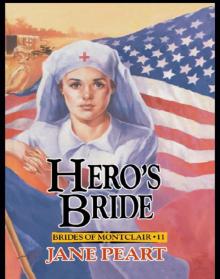 Hero's Bride
Hero's Bride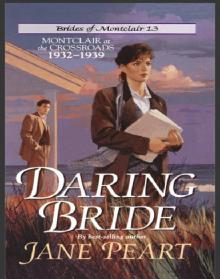 Daring Bride
Daring Bride Runaway Heart
Runaway Heart Promise of the Valley
Promise of the Valley Gallant Bride
Gallant Bride The Pledge, Value
The Pledge, Value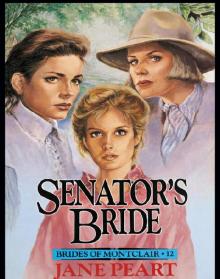 Senator's Bride
Senator's Bride Valiant Bride
Valiant Bride Shadow Bride
Shadow Bride Destiny's Bride
Destiny's Bride A Tangled Web
A Tangled Web Folly's Bride
Folly's Bride The Promise
The Promise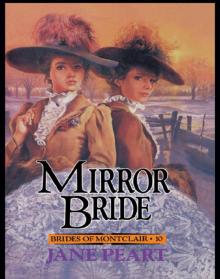 Mirror Bride
Mirror Bride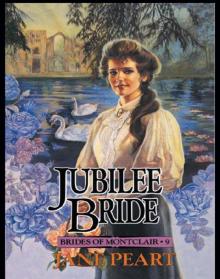 Jubilee Bride
Jubilee Bride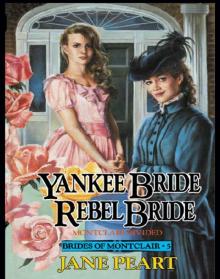 Yankee Bride / Rebel Bride
Yankee Bride / Rebel Bride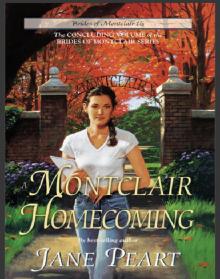 A Montclair Homecoming
A Montclair Homecoming Fortune's Bride
Fortune's Bride Undaunted Spirit
Undaunted Spirit Love Takes Flight
Love Takes Flight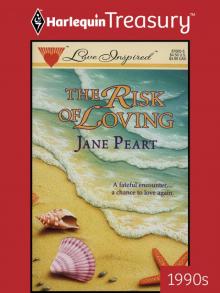 The Risk of Loving
The Risk of Loving The Pattern
The Pattern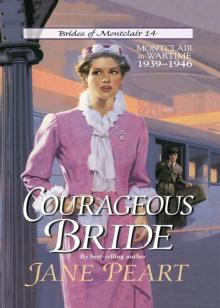 Courageous Bride
Courageous Bride